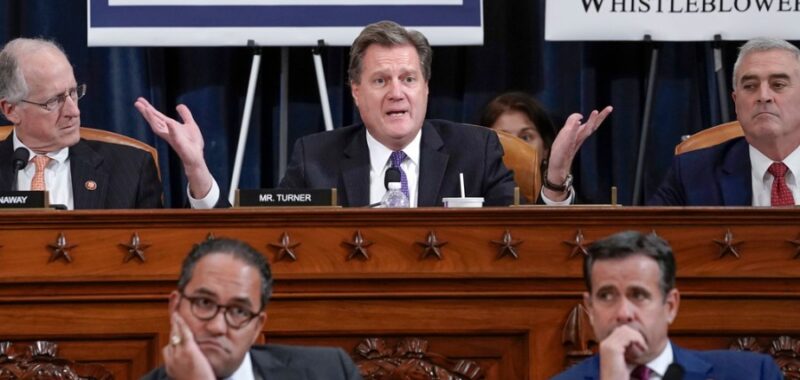
The news last week that House Speaker Mike Johnson (R-La.) would not reappoint Rep. Mike Turner (R-Ohio) as chair of the House Intelligence Committee sent tremors rippling across Capitol Hill as to what it means for relationships between President Donald Trump and congressional committees — and not just those committees charged with overseeing intelligence activities.
The Speaker instead tapped the next ranking committee Republican, Rep. Rick Crawford (Ark.), to chair the panel. Crawford, like Trump, has been skeptical about continued U.S. military aid to Ukraine in its war with Russia, whereas Turner, a defense hawk, has vigorously pushed for more American aid to Ukraine.
When asked why he made the switch, Johnson said, “We just need fresh horses in some of these places.” In his press announcement the Speaker still had fulsome praise for Turner’s “leadership and critical work during the 118th Congress.” Turner will continue to serve as a member of the House Armed Services and Oversight and Government Reform committees, though the Speaker’s press release only mentions that Turner will continue in “his important position as the Chair of the U.S. Delegation to the NATO Parliamentary Assembly.”
It should be emphasized that the Speaker was fully within his powers to make the change. Under House rules, all joint, select, ad hoc, and conference committees are appointed by the Speaker without the need for House approval. The Speaker had not yet named his choices for the current Congress when he announced that Turner would not be re-appointed to the chairmanship for the 119th Congress.
Last Thursday, the House Speaker pro tempore read the list to the House of Johnson’s 14 Republican designees to serve on what is formally called the House Permanent Select Committee on Intelligence. On Tuesday, the Speaker inserted in the record the names of the 11 Democratic appointees to the 25-member panel.
What is disturbing is the rumored source of the Speaker’s decision to drop Turner as chair. Turner told CBS News that he was fired over “concerns from Mar-a-Lago.” While Speaker Johnson and a Trump spokesman both denied that the then-president-elect directly demanded the change, various media reports ascribe the move to either Trump, directly or indirectly, or to a handful of Freedom Caucus members who had met with Trump shortly before Johnson’s announcement. The Freedom Caucus members thought the chairman was insufficiently loyal to Trump’s plans and too bipartisan.
The Senate and House permanent select committees on intelligence were formally established in the mid-1970s in the wake of press reports that the Central Intelligence Agency had spied on Americans opposed to the Vietnam War and had interfered in Chile’s elections. The subsequent investigations and findings by House and Senate special investigative committees were so explosive that both houses agreed on the need to establish their own permanent select intelligence committees — the Senate in 1975 and the House in 1977.
Under House rules, the Intel committee must contain at least one member from each of the following committees: Appropriations, Armed Services, Foreign Affairs and Judiciary. The committee’s portfolio extends to the activities of the Office of National Intelligence, the CIA, the Defense Intelligence Agency, the National Security Agency, the Federal Bureau of Investigation, “and the intelligence-related activities of all other departments and agencies of the executive branch” — some 17 entities in all.
The current power play at the House Intelligence Committee has more than symbolic importance given the committee’s central role in coordinating both oversight and funding levels of the intelligence community. Moreover, the move sent a strong signal to other committees and their chairmen either to get on board the Trump administration’s launch, or else.
Given President Trump’s sometimes unique and changing priorities, especially in the field of foreign policy, it is more imperative than ever that Congress keep a close eye on things and perform the oversight and funding functions necessary to ensure our constitutional system of checks and balances holds. Certainly the president expects full backing for his programs from Republicans on the Hill, and party members, committee chairs and leaders have pledged their complete support for passing the president’s agenda.
If Congress does not deliver, one can expect the president will again go around Congress with executive orders (as on his opening day), and seek retribution on those who let him down.
Our constitutional system of separated powers was built into the document to ensure no single branch of government would become so overbearing and dominant that it would reduce the other branches to empty shells. That will be a major challenge facing Congress in the days and months ahead.
Don Wolfensberger is a 28-year congressional staff veteran culminating as chief-of-staff of the House Rules Committee in 1995. He is author of, “Congress and the People: Deliberative Democracy on Trial” (2000), and, “Changing Cultures in Congress: From Fair Play to Power Plays” (2018).

